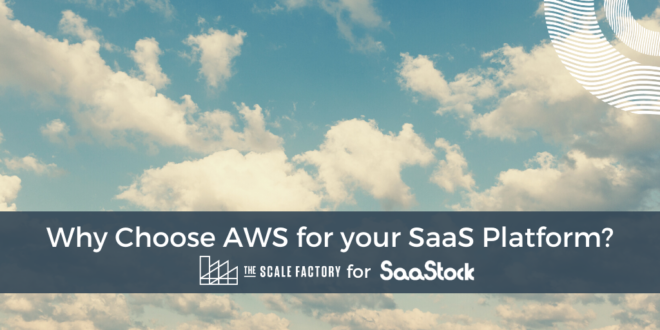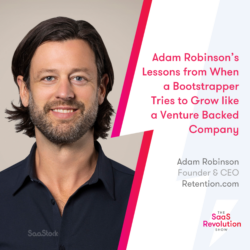This is a guest blog post by Jon Topper, Founder and CEO at The Scale Factory, a cloud infrastructure consultancy based in London, UK and AWS Advanced Consulting Partner. Jon Topper delivered a lightning talk at SaaStock Remote 2020, which you can watch now.
If you’re building a new SaaS offering, then like most online businesses, you’re probably thinking about using the cloud. This is a great choice: the economics and scalability of public cloud infrastructure match the needs of a growing SaaS business really well.
In this post I’ll talk about the things you should consider when choosing a platform, and then explain why I think AWS is a good choice.
Benefits of working in the cloud
Scalable
Cloud platforms are hugely scalable. The large vendors all have vast quantities of compute and storage resources, connected to the rest of the world via large, highly performant networks.
You can start as small as you need, and increase your use of the cloud as your business grows. Gone are the bad old days where provisioning new capacity took purchase orders and a 6 week lead time from your hardware distributor. Today, in a well-architected cloud infrastructure, capacity is elastic: you can scale up and down to match demand on a minute by minute basis.
Global
The major cloud players all have a global footprint, making it easy to build your solutions in region as close to your customers as possible, resulting in lower latency connections and a better experience for your users.
Having access to global infrastructure also allows you to conform to laws and regulations about where data can be held in every market you sell into.
Highly Available
Within a single global location, most cloud vendors provide their services from multiple data centres, often called Availability Zones. These are designed to be independent from each other with power, cooling, and networking capabilities provided in such a way that a failure in one location won’t impact on another.
Availability Zones are typically located within the same metropolitan area, and are connected by low-latency network links so that data can be replicated between them in near real-time.
Cost-effective
That level of responsive scalability is also great for managing costs. If the size of your infrastructure is responsive to demand, then you only pay for the resources needed at any one time – there’s no waste.
By investing in monitoring, you can attribute infrastructure costs on a per-customer basis, allowing you to track the profitability of each customer, or pass the costs on, depending on your commercial model.
Agile
The modern business landscape moves quickly, and a great way to gain a competitive advantage is to be able to move faster than the competition. The quicker you can make changes, the more product hypotheses you can test in a month, and the sooner you can converge on a product idea that customers really want.
Making changes to your cloud platform doesn’t require you to phone a supplier, open tickets, or write a business cases. The cloud is fundamentally self-service, and you can modify it easily by making API calls, clicking in a web console or, better yet, using infrastructure-as-code tools like Hashicorp’s Terraform.
Secure
Adopting cloud infrastructure means you get to take various difficult challenges, and share the responsibility for overcoming them with your cloud vendor.Security is a great example of this sort of sharing of responsibility. You’ll need to write secure application code, and make secure design choices when putting your solution together. The cloud vendor will keep your network secure, provide encryption capabilities, and make sure their services are patched against vulnerabilities.
Benefits of choosing AWS for your SaaS application
We’ve been partnered with Amazon Web Services (AWS) to deliver customer solutions for almost six years. The other cloud vendors have some great technologies, but in our view, the Amazon cloud is where you should be building your SaaS platform.
Broad choice of managed services
AWS is a complex, evolving ecosystem, with – at current count – 175 services. With the right help you can build and run almost anything there.
Whatever shape your data, there’s a highly available, scalable managed database service like Amazon Aurora to suit. Boring administrative tasks like taking backups and running upgrades are all taken care of by the AWS platform itself.
If you choose “serverless” compute components such as AWS Lambda or AWS Fargate, then even operating system patching is taken care of by the platform, leaving your engineers free to spend their time adding valuable features to your apps.
Amazon API Gateway is a great starting point for building REST, HTTP, and WebSocket APIs at any scale. Coupled with Amazon Cognito, you can build a strong identity foundation into everything you create, allowing users to sign in through their existing social identity providers.
Security and compliance focus
AWS has tenancy options to suit everyone. Depending on the security and compliance needs of your customers, weighed against their budget, you can isolate them from each other in a number of different ways. With the right design, you can build a pool of resources to be shared by the majority of customers, and wholly separate per-customer accounts to keep your bigger customers happy – all using the same components and automation tools.
AWS PrivateLink even lets your customers connect to the services you offer without passing traffic over the public internet, which is great for enterprises who need strong security guarantees.
Established partner ecosystem
AWS has a global network of partners like The Scale Factory helping customers build and sell their offerings. Consulting Partners specialise in key areas of the AWS platform or key market sectors, combining deep knowledge of the cloud platform itself with an understanding of the constraints and concerns of your business and customers. By working with a partner like us you can avoid some common mistakes, and ensure your own team’s resources are focused on delivering real business value for your customers.
You may also be interested in becoming an APN Technology Partner. Through this program AWS provides resources to build your business, and opportunities to market and sell with AWS.
We’re an AWS Advanced Consulting Partner, and we were recently awarded a SaaS Competency designation recognising our strong track record building secure and cost-effective solutions for SaaS businesses. If you’re building your platform on AWS, get in touch for guidance, a design review, training, and access to funding opportunities.





